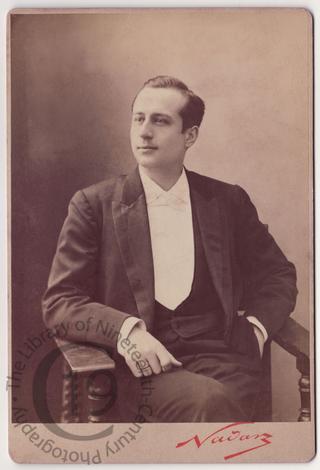
Alexander Ilyich Siloti
A cabinet card portrait of the Russian pianist, conductor and composer Alexander Ilyich Siloti (1863-1945), one of Russia’s most important artists in the generation prior to 1917.
Siloti, whose surname is sometimes transliterated as Ziloti, was born on his father's estate near Kharkiv, Ukraine (then part of Imperial Russia). He studied piano at the Moscow Conservatory with Nikolai Zverev from 1871, then from 1875 under Nikolai Rubinstein, brother of the more famous Anton Rubinstein; he also studied counterpoint under Sergei Taneyev, harmony under Pyotr Ilyich Tchaikovsky, and theory under Nikolai Hubert. He graduated with the Gold Medal in Piano in 1881. Siloti went to Weimar, Germany to further his studies with Franz Liszt, co-founding the Liszt-Verein in Leipzig, and making his professional debut on 19 November 1883. Returning to Russia in 1887, Siloti taught at the Moscow Conservatory, where his students included his first cousin Sergei Rachmaninoff. During this period he also began work as editor for Tchaikovsky, particularly on the First and Second piano concertos.
Siloti married Vera Tretyakova, herself a pianist and the daughter of wealthy industrialist and art collector Pavel Tretyakov. He left his post at the Conservatory in May 1891, and from 1892-1900 lived and toured in Europe with his wife and young children. He also toured New York, Boston, Cincinnati and Chicago in 1898. As a conductor Siloti gave the world premiere of Rachmaninoff's Piano Concerto No. 2 with the composer as soloist in 1901. From 1901-1903, he led the Moscow Philharmonic; from 1903-1917, he organized, financed, and conducted the influential Siloti Concerts in St Petersburg, collaborating with the critic and musicologist Alexander Ossovsky. Ballet impresario Sergei Diaghilev first heard Stravinsky's music at one of the Siloti Concerts.
In 1918, Siloti was appointed Intendant of the Mariinsky Theatre, but late the following year fled what had become Soviet Russia for England, finally settling in New York in December 1921. From 1925-1942 he taught at the Juilliard Graduate School, performing occasionally in recital. In November 1930 gave a legendary all-Liszt concert with Arturo Toscanini.
Alexander Siloti died in New York on 8 December 1945. He is buried at the Russian Orthodox Convent Novo-Diveevo Cemetery, Nanuet, New York.
Photographed by Nadar of Paris.
Code: 125489




